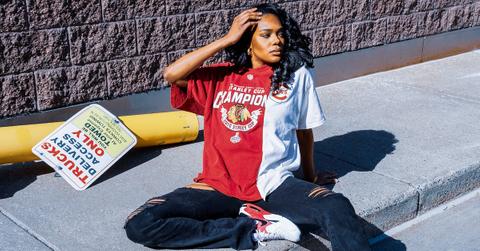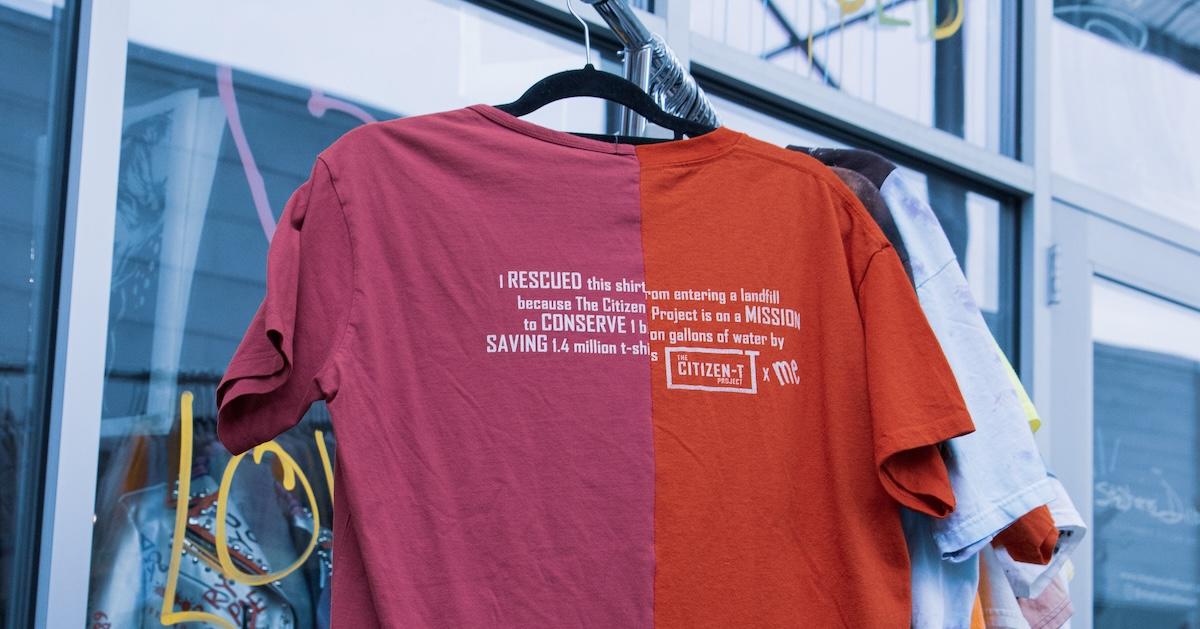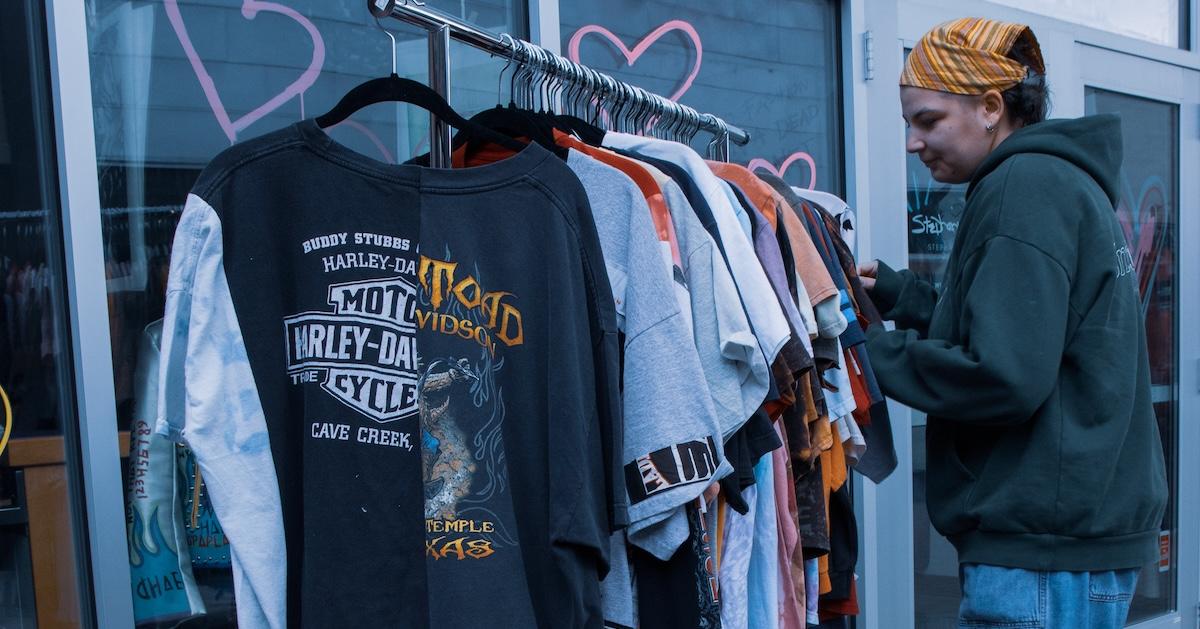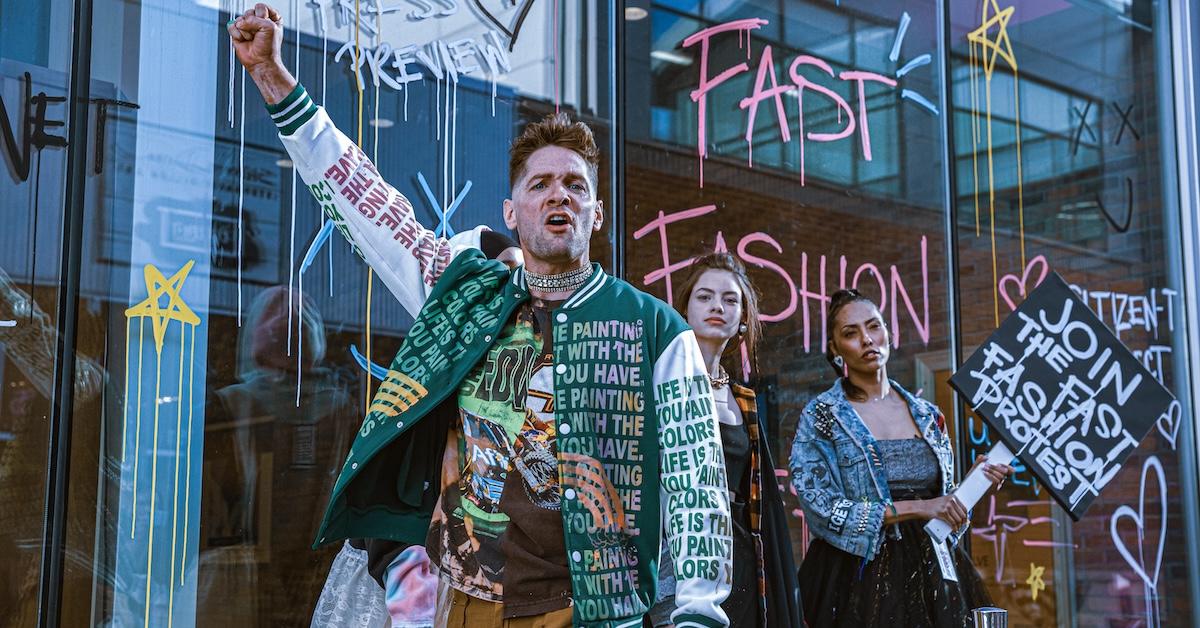This Artist Is Upcycling Discarded Event T-Shirts Into New, Trendy Tees
In this guest piece, environmental creator Isaias Hernandez and artist Stephanie Dillon write about what inspired their upcycled fashion brand, Citizen-T.
Published June 3 2024, 10:45 a.m. ET

Gen Z is shaking up the fashion market like never before. Tiring of the same old fast fashion brands pumping out repetitive designs on cheaply made clothing, Gen Zers are turning their backs on mainstream labels. Instead, they are seeking out brands that align with their values and identities; they want to know that their purchases are making a positive impact.
This shift has led to the rise of lean, innovative companies that focus on values and authenticity — like our brand, Citizen-T, which upcycles used T-shirts into new fashion pieces.

Even more so than buying from sustainable brands, Gen Zers are passionate about thrifted and upcycled fashion.
Platforms like Depop and Grailed are seeing a surge in popularity as young people look for one-of-a-kind pieces. Upcycling, the process of transforming old materials into new creations, is also gaining traction. This trend is not only environmentally-friendly, but also allows creators to express their creativity and individuality.
In a world where fast fashion has dominated for so long, Gen Z is leading the charge for change. This generation is redefining what it means to be fashionable and showing that conscious consumerism is a reliable way forward. The fashion market has a chance to adapt to this new reality. It's time for brands to listen to the demands of the younger generations, or risk being left behind.
As Gen Zers and millennials continue to increase their buying power and influence in the market, there has been a noticeable shift towards sustainable consumption. Specifically, upcycled products have captured the attention of around 59 percent of Gen Z and 57 percent of millennials according to Forbes showcasing a growing interest in eco-friendly and innovative products.
The appeal of upcycled items goes beyond just being cost-effective. It also aligns with the sustainable values of Gen Z and reflects a deeper connection between art, activism, and fashion. This is what inspired us to create Citizen-T.

Citizen-T aims to redefine the future of embracing preloved clothing.
Citizen-T respects a desire for quality clothing and doesn’t see that as a limitation for finding new means of producing those clothes. It’s a challenge to halt the prevailing culture of disposable fashion, so we start with a simple idea: What if we repurpose the countless tees discarded at events, concerts, and festivals? These garments are often worn for just a single day before being discarded, contributing to the mounting textile waste crisis.
Citizen-T is guided by three core principles: sustainability, community, and creativity. By prioritizing these pillars in our decision-making processes, Citizen-T is not only helping others contribute to a more sustainable future but also inviting industries to rethink their approach to fashion production.
The demand for change is already here. The rise of resell models for items has been gaining traction among consumers. A significant 48 percent of millennials, along with 46 percent of Gen Z and Gen X, are interested in purchasing pre-owned or secondhand items, per the above Forbes article. This trend not only reflects a desire for unique and vintage pieces but also aligns with the growing emphasis on reducing waste and promoting a circular economy.
Overall, the data suggests that younger consumers are increasingly conscious of their environmental impact and actively seek sustainable alternatives in their purchasing decisions. This shift towards fair practices bodes well for the future of the retail industry and signals a greater demand for ethical and environmentally-friendly products.

The fashion industry is more wasteful than you might think.
The fashion and textile industry’s production, distribution, and disposal processes contribute significantly to global waste and pollution. For decades, the industry has operated on a linear "take-make-waste" model, which promotes fast production and disposal, resulting in wasting resources and overwhelming waste management systems, ultimately causing immense harm to communities, particularly in poorer regions.
Consider these statistics: Approximately 60 percent of clothing is made of plastic, and a garbage truck's worth of clothing is landfilled or incinerated every second, resulting in an estimated 92 million tons of textile waste annually. The water used in the production of these clothes, only to be disposed of, could meet the needs of 5 million people. Additionally, up to 10 percent of global carbon emissions come from the fashion industry, highlighting the urgent need for change in consumer behavior.

During Fashion Week Minnesota in April 2024, Citizen-T hosted a fast fashion protest to raise awareness of its commitment to the local fashion community.
Along with other upcycling-based fashion brands, Citizen-T represents how innovative our approaches can be: Something as simple as collecting unwanted T-shirts from individuals, businesses, and event organizers, and diverting them from the waste stream, can become an entire business model. These garments aren’t waste — far from it. At Citizen-T, these garments are carefully sorted, cleaned, and transformed into unique, new products by skilled artists and makers. This process not only gives new life to discarded textiles but also creates visually appealing items.
Fashion is a reflection of humanity, allowing us to express ourselves through our clothing without causing harm to others or the planet. With Citizen-T, we hope to lead the way in innovating solutions to the environmental challenges faced by the industry, setting an example for others to follow. This is just the beginning of a movement towards more sustainable practices in the fashion and textile industry, as the world seeks practical solutions to address global issues.
Stephanie Dillon is the founder and Isaias Hernandez is the Sustainability Advisor of Citizen-T, a sustainable clothing line using deadstock T-shirts and existing materials to make new garments.